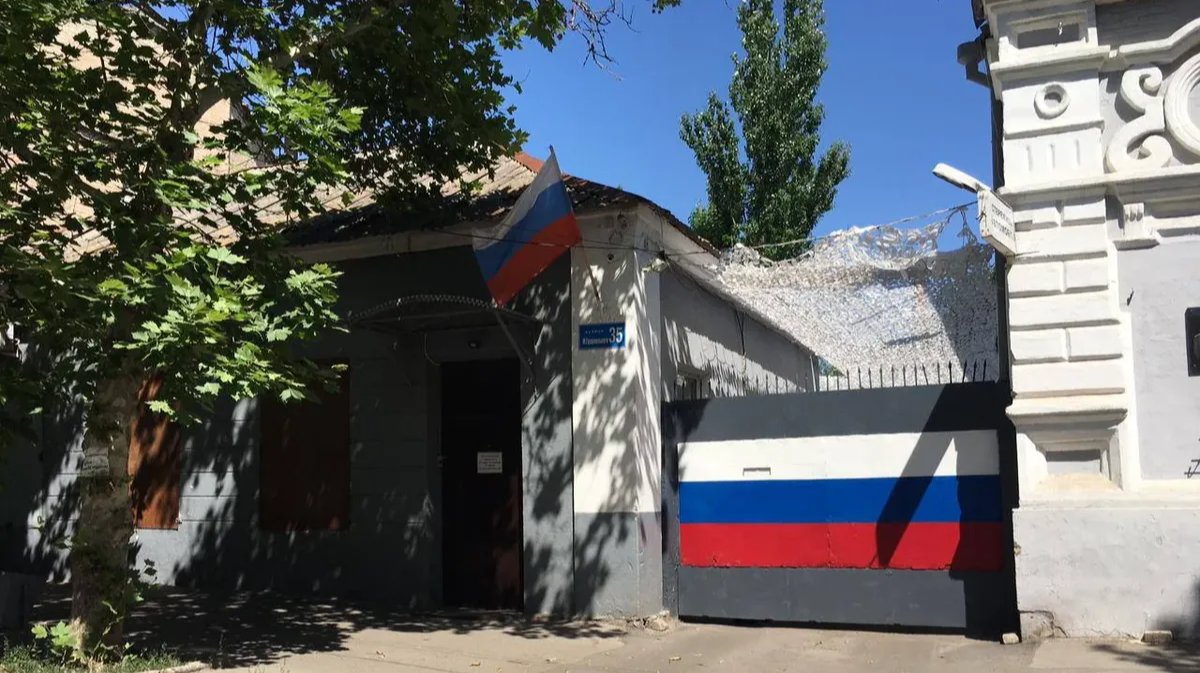The road where people get lost
At 8 in the morning, a new SIMAZ bus covered in the “Z” symbol stickers departs from Simferopol, a major city in Crimea, to Melitopol, a city in Ukraine’s Zaporizhzhia region currently occupied by Russia. There are a lot of TV cameras around. Oksana Mazur from the local coach company, and Nikolay Lukashenko, Crimea’s interim minister of transportation, explain the procedure of crossing the border between Crimea and Ukraine’s Kherson region, also occupied by Russia.
Most of the passengers are Ukrainian nationals. Some are returning home, others seek to retrieve their belongings or see their family members. Those who have Russian passports mostly go to Melitopol to bring their relatives medicines; one of the families came here from Russia’s Far East to do so.
It takes two and a half hours to get from Simferopol to Chonhar where a border checkpoint is located. Arriving in Chonhar, I see Crimean TV cameras again. A vigorous reporter is trying to convince someone to speak on camera about the trip.
Crossing the border here is a game of chance. Each traveller is asked routine questions: What is your destination? Who are you visiting? How long are you planning on staying? Where are you from? Why have you decided to travel now? and so on.
Men are questioned for longer periods than women. If a border patrol officer finds someone’s answers dishonest, they call for their colleague, and the person is escorted to a special place civilians call “the filter”. All people with tattoos are escorted there, even if they only have a flower or a butterfly tattooed on their skin.
The “rejected” passengers are sat outside on a bench next to the soldiers on their smoke break, waiting for their turn. Normally these people are watched by one or two armed soldiers. During the wait, some of them erase “suspicious” pictures or messages from their phones. Sometimes the soldiers ask them questions and go through their phones to hurry things up.
The first question people are asked as they go through “the filter” is: Are you acquainted with anyone in Ukraine’s military? They also ask what the traveller thinks of the ongoing "special operation" or the Azov regiment. The same questions are asked later during a talk with a Federal Security Service (FSB) officer in a separate room. The preliminary questioning might make the private talk shorter, but it is not always the case.
There are two differences between the private and the preliminary talk. The first one is when the FSB officer takes some notes while speaking, they may ask for the person’s phone number or some details from their biography. The second is that no one can see what goes on behind the closed doors during the private talk.
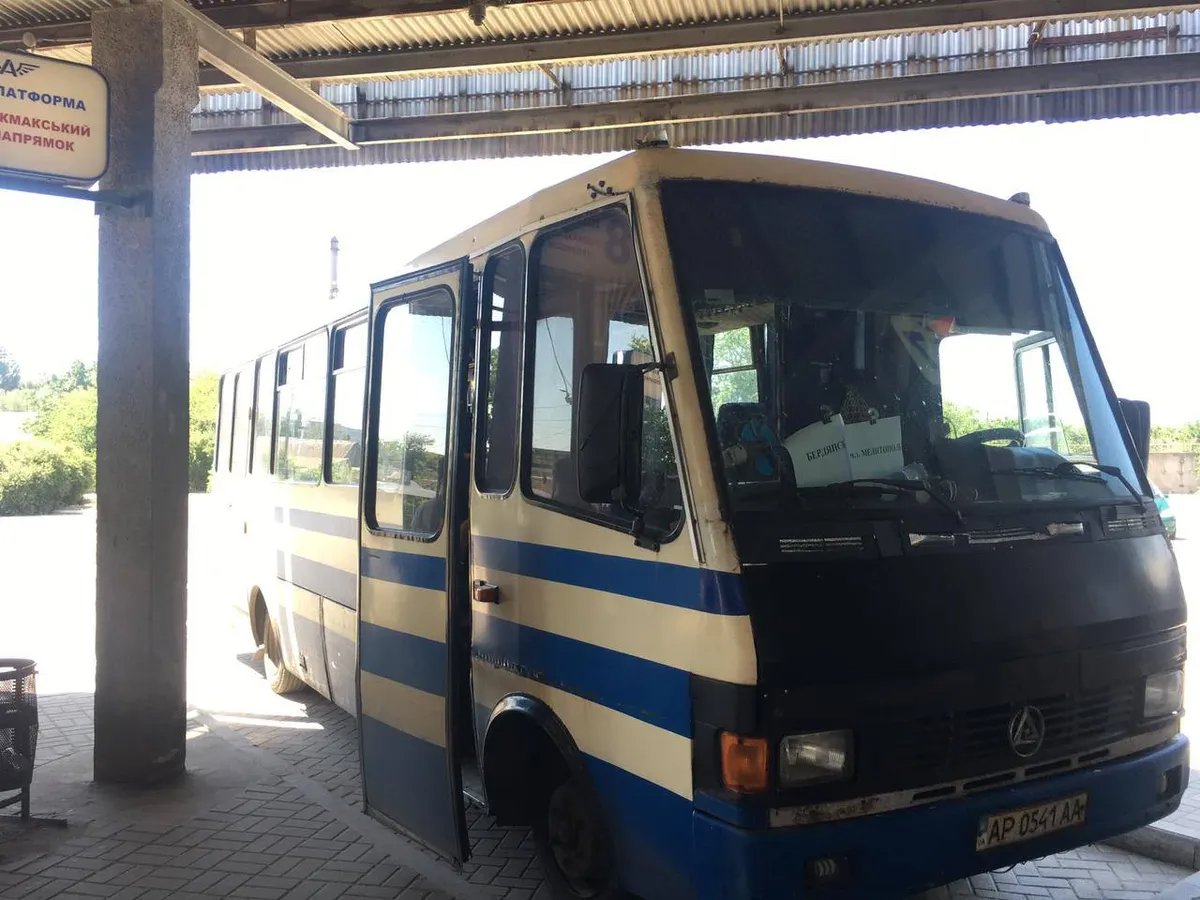
The bus that awaits the passengers once they have crossed the border. Photo: Sonia Mustaeva
Some spend hours or even days in “the filter”. Luckily, I managed to avoid this procedure; although I felt as if I was walking on the razor’s edge as I spoke to a border patrol officer.
This is how our conversation ended:
“Do you think this is the right time to pay your friends a visit?” he asked me.
“Well, they told me it’s calm there now, no shootings,” I answered as I pretended to be as naive as possible, following the rhetoric of Russia’s TV propaganda. He looked at me with a weird expression for a while, then handed me my passport and the paper that would grant me clear passage.
There are no TV reporters on the other side of the border. Moreover, our comfortable SIMAZ bus stays in Crimea; and we are to use an old shabby Ukrainian BAZ. There are no “Z” symbols here, and it is stuffy inside of the vehicle. Some passengers start complaining about the heat, looking around in search of TV reporters. They say they “have been deceived”:
“There’s no A/C here, it’s burning hot!”
“The previous bus was a comfortable one, this right here is a cattle truck…”
“Where are the lads anyway?”
“In the filter.”
“Argh, they told us it would take no longer than an hour…”
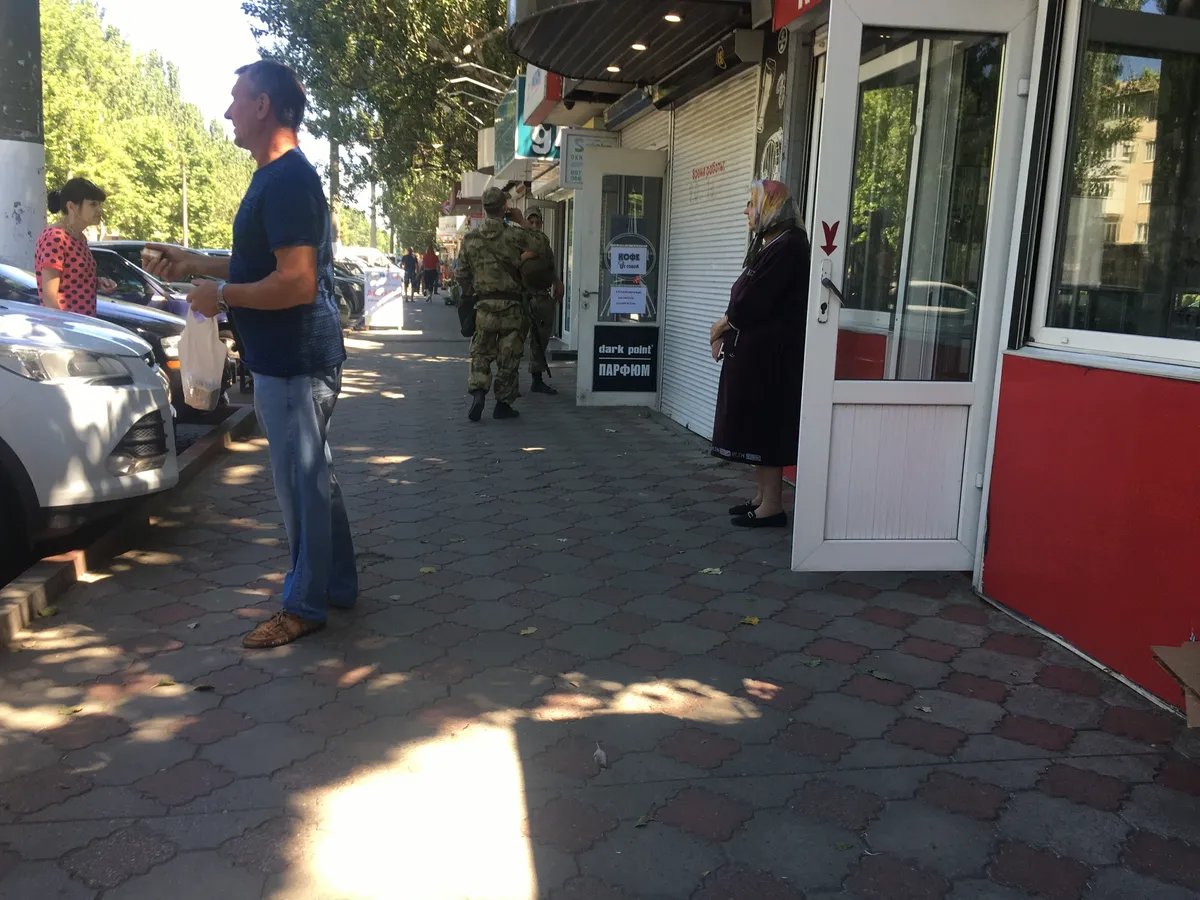
Armed soldiers on the streets of Melitopol. Photo: Sonia Mustaeva
The passengers are trying to figure out who was left behind. A young man was not granted passage; it is unclear what had happened to him.
We are off; now passing through the destroyed Ukrainian checkpoint. The building has all of its windows smashed, and wires are sticking out from an auto barrier. The signs stating rules of entering Ukraine are down on the ground.
A few miles away is a Russian roadblock; it is made out of sacks and wooden pallets and has several flags attached to it: the Imperial Standard, Russia’s national flag, a “DPR” one, and a Soviet Victory banner. Five armed men in military uniform stand guard, their faces covered with balaclavas and sunglasses. Our driver tells them his voyage code, and we are granted passage with no vetting. Then, we pass through three more roadblocks. One of them brings a young soldier, no older than 20, into our bus. He reluctantly asks us to show our passports. We raise our IDs into the air, and that is it.
Along the road there are tents where they sell dried fish, destroyed gas stations, and billboards with social advertising in Russian: a slogan reading “The land of Zaporizhzhia, these are your heroes!” depicting Heroes of the Soviet Union from Berdyansk and Melitopol, or a different slogan which says “220 years of the Taurida Governorate. One history, one way” and pictures of Catherine the Great, the Russian empress, and Grigory Potyomkin and Alexander Suvorov, her generals.
It takes about two hours to get from Chonhar to Melitopol.
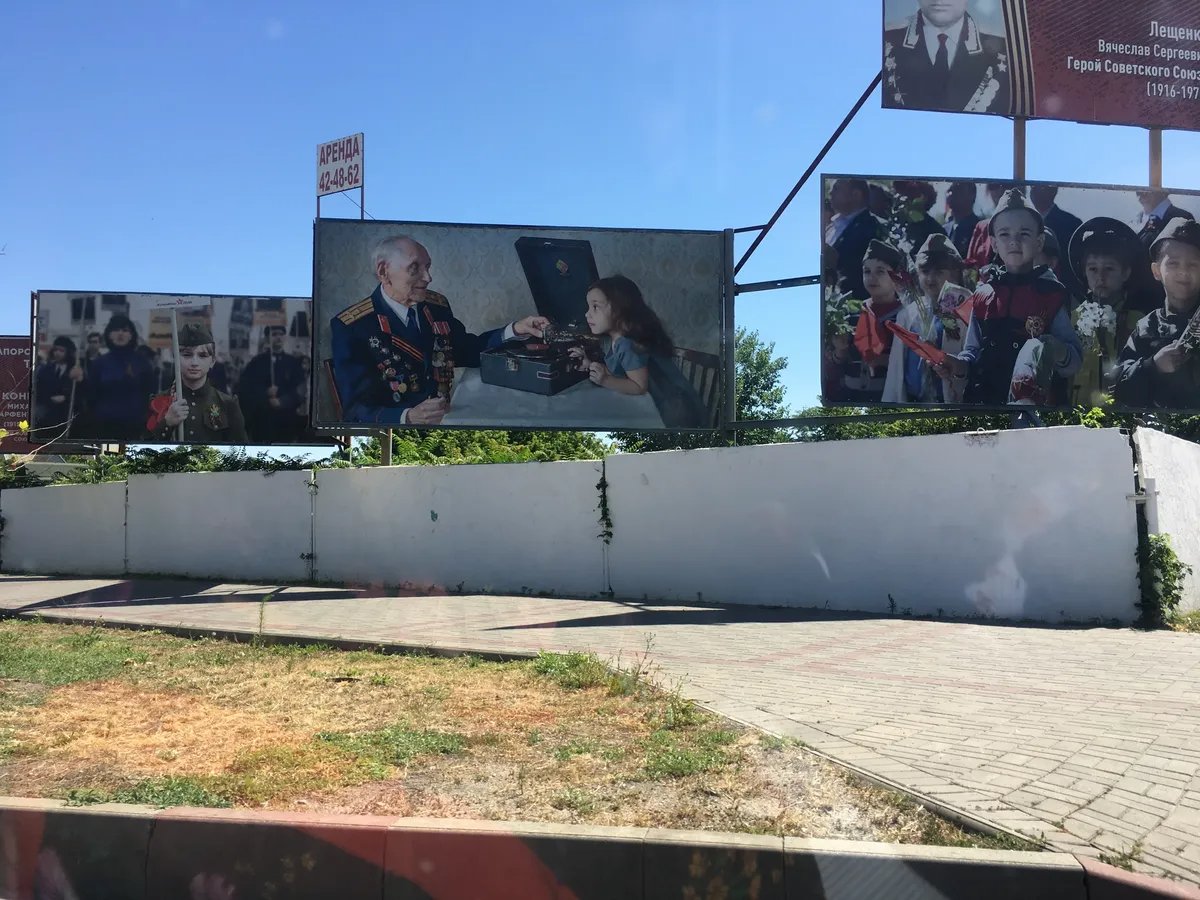
Billboards dedicated to Victory Day. Photo: Sonia Mustaeva
The abundance of pro-Russian billboards all over the place is the first thing that catches the eye of the arriving travellers. They display photos of Soviet veterans, kids in military uniform, congratulations on Day of Russia and Victory Day, calls for “preserving the family values” and, most surprisingly,
pictures of Alexander Nevsky. There are some newer billboards as well with Vladimir Putin’s quotes on a potential autumn "referendum" on merging the region with Russia.
The lampposts have Russian flags and Victory Day decorations, too. One of the locals tells me the posts had Ukraine’s flags on them before. “The first thing the invaders did when they captured the city was remove all Ukrainian-language advertisement posters,” he says. The Russian-language ones remained intact, though.
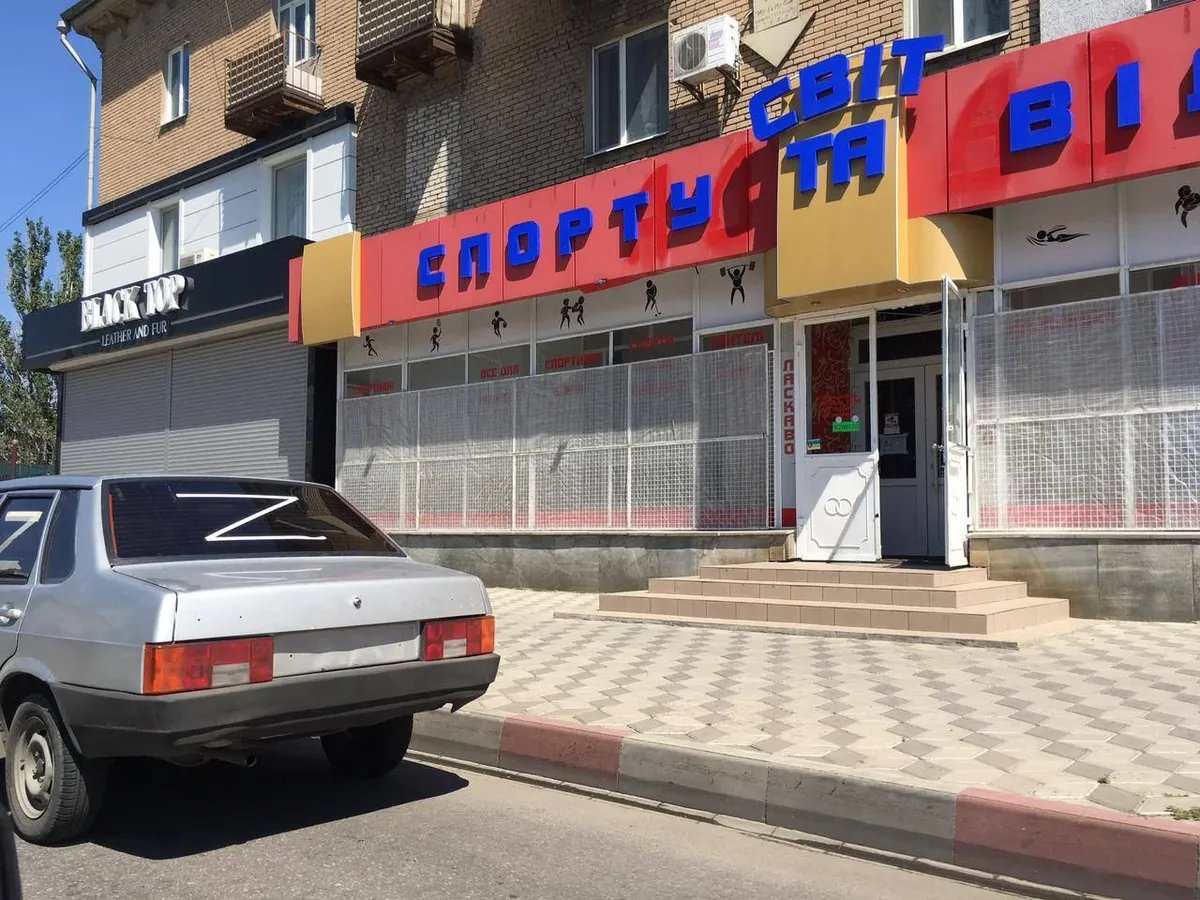
Their customs
Mykhailo and his wife Olha have agreed to show me around the city. The couple has a 1-year-old son Petro. I changed their names here for safety purposes. Mykhailo shares some details of the new customs of the new age as we drive from the bus terminal to the city centre.
“You see that car with no licence plate and a “Z” sticker on the rear window? This means our new ‘police’ stole this car from someone. This ‘police’ is actually former convicts; the locals never use ‘Z’ stickers here.”
“How do you know they are convicts?” I ask him.
“They took my car by force, too. I used to work with them in the past, they told me they had spent time in prison.” Mykhailo shows me the men in question as we drive past the police station. The new policemen are on a smoke break; they do not notice us.
“And what do these red and yellow TVR licence plates mean?” I ask.
“Some people get them from the local traffic police. The TVR means the Taurida Governorate. Those are not real licence plates but stickers that they glue over the Ukrainian flag. If I had one, I would be passing all roadblocks without having my car searched. Having a “Z” sticker glued to your car makes you a king of the local roads. Luckily, there are very few cars like these.”
Another interesting thing I notice is that all military vehicles have their licence plates partly covered with tape. Such transport does not obey road traffic regulations. Mykhailo says a “zed” (this is how the locals call Russian soldiers) nearly ran him over once.
All administration buildings have been captured and have had Russian flags hung up on them.
The names of the streets are still in Ukrainian, though. A conscription office has its windows boarded up, and there is a huge painting of the Russian flag on its gate. The local schools also have Russian flags waving over them, but there are vehicles in their parking lots which have the words “school bus” written on their sides in Ukrainian.
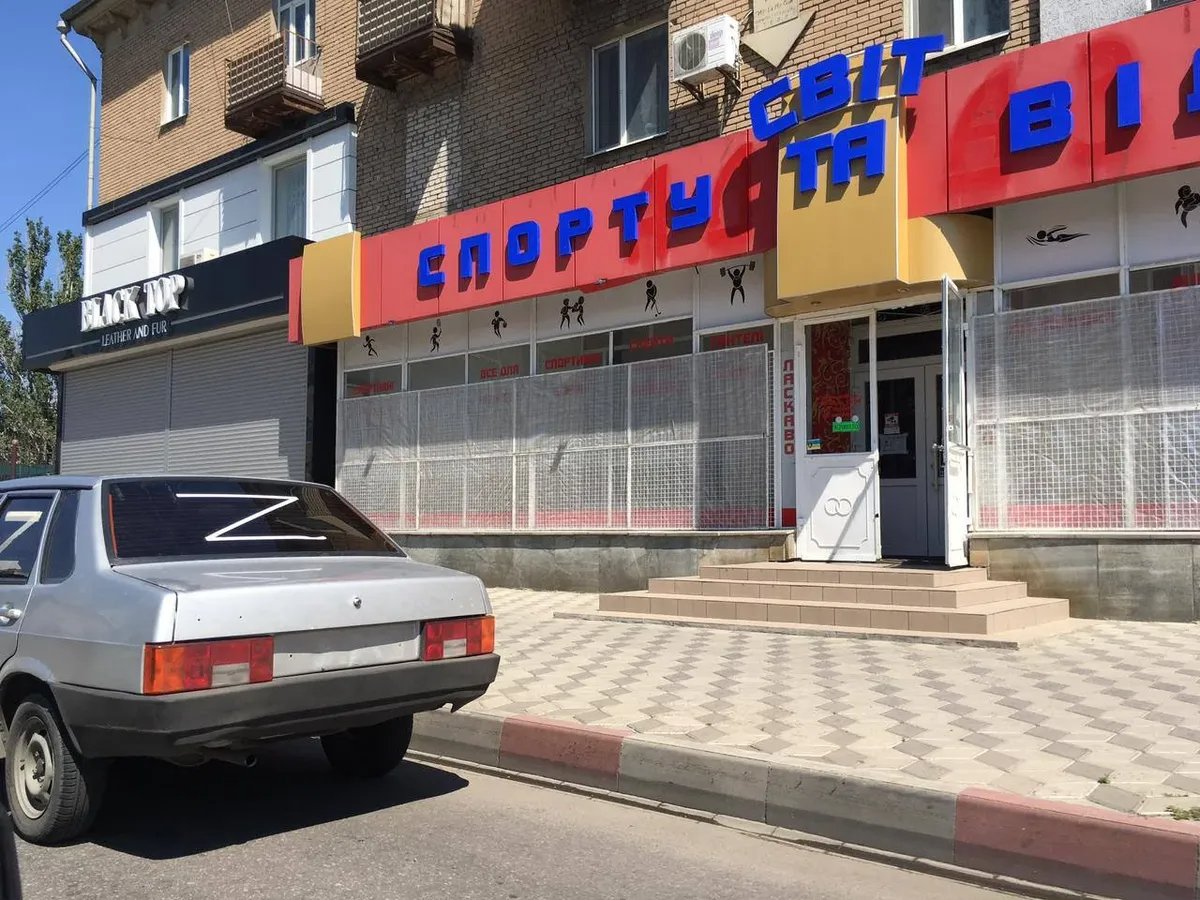
Cars without licence plates and with a “Z” symbol on them have probably been stolen. Photo: Sonia Mustaeva
Russia set up an occupying administration here in Melitopol. These people spend their time explaining to the locals how to obtain a Russian passport, humanitarian aid, and a 10,000 rubles (€160) payout from the Russian government. Each administration building has soldiers on guard.
There is a huge crowd of several hundred pensioners in front of the post office in the heart of the city; some of them sit on camp stools. These people have lined up to receive retirement payouts from the new authorities. Two persons are allowed inside the building at a time; two armed soldiers supervise the process. They are trying to cheer up the crowd when one of the soldiers accidentally drops his rifle on the ground, which makes the elders giggle for a while.
“Which number is it for today?”
“Five hundred and something, I reckon. Have you signed up?”
“Yes, our number is 824.”
“You’re the lucky ones. Our number is 1150. Maybe you’ll get lucky today.”
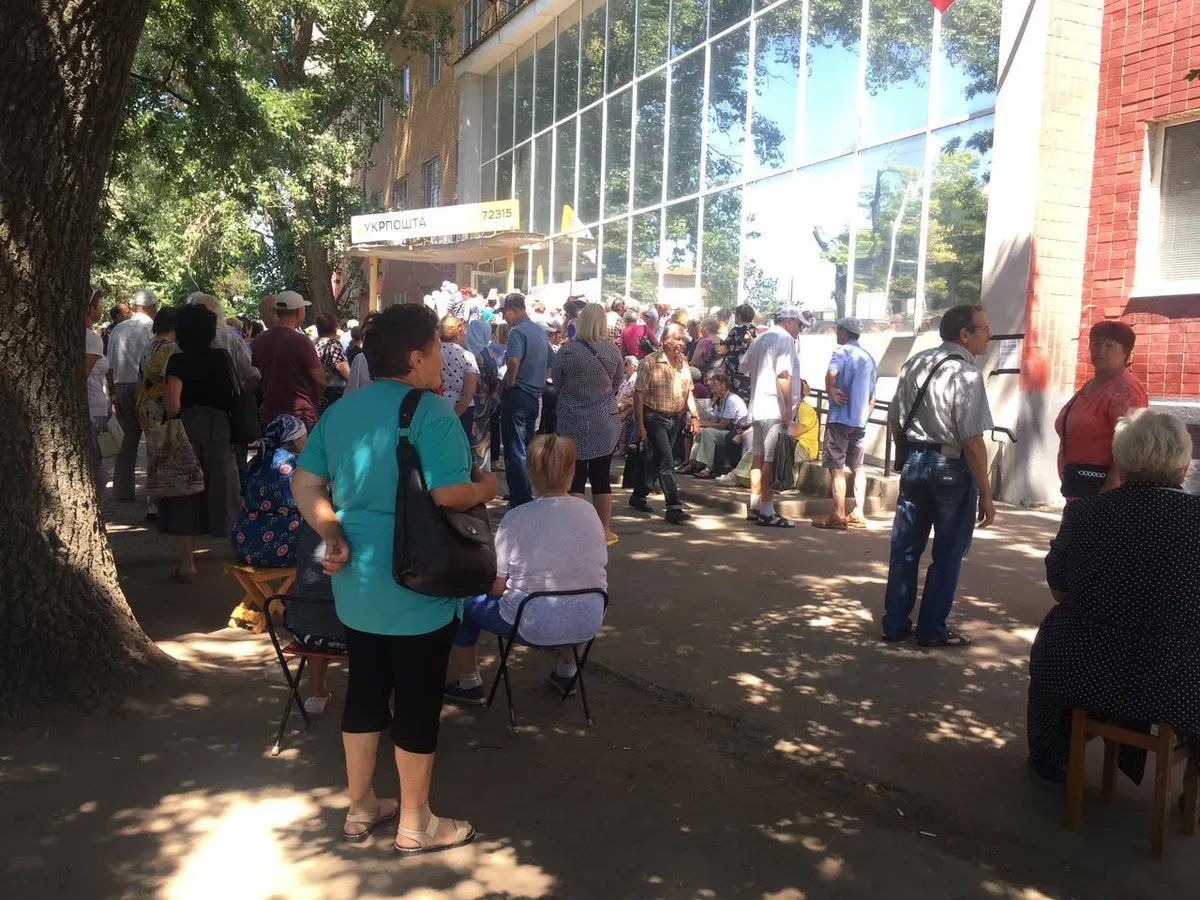
The queue. Photo: Sonia Mustaeva
Such conversations are not rare. People come here every day, waiting to get their payouts. Each one of them is afraid to miss their turn, so they arrive early in the morning as if it was their job.
“The same happened when they handed out SIM-cards. The craze ended eventually,” Olha says.
The now empty Victory Square in Melitopol’s downtown used to be a place where people who were against the new authorities would gather to protest in early March.
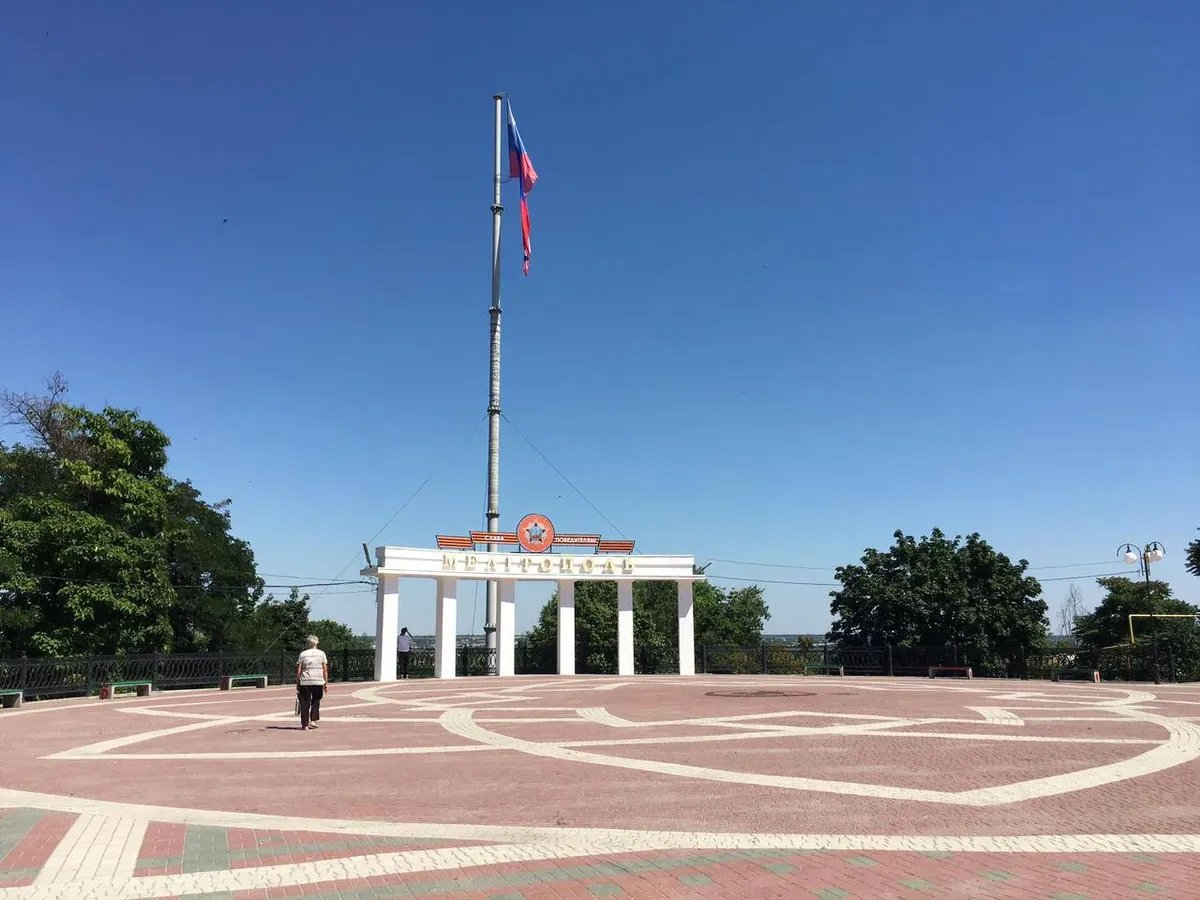
The Liberators Arch in Victory Square was de-communised by Ukraine’s authorities in 2016 and had Russian Victory Day symbols removed. The occupying authorities have now restored its past condition. Photo: Sonia Mustaeva
They would get inside the fountain and wave Ukrainian flags, chanting pro-Ukrainian slogans. After Ukraine’s army had finally retreated from the city, such rallies were banned, and the fountain itself was repainted from yellow-blue to yellow-green.
“You might end up being detained should you get too close to the fountain, so we avoid getting close,” Olha says.
The local marriage registry is located nearby. It has papers glued to its doors which state the addresses of the local garrison headquarters and police station; there are offers for locals to get a job in an unnamed company, mentioning the job requirements, phone number, and email address; the info on how to receive humanitarian aid is also here. There is a sign saying that, back in May, the local cinema invited people to come and watch films free of charge; the showings range from old Soviet movie classics to modern Russian kids cartoons.
The Liberators Arch in Victory Square was de-communised by Ukraine’s authorities in 2016 and had Russian Victory Day symbols removed. The occupying authorities have now restored its past condition. A huge post behind the arch holds a Russian flag. There is an ideological fight going on, the goal of which is to replace Ukraine’s colours with Russian ones, although the plaques of the local shops and street name plates prove what Russia’s military is trying to erase: Melitopol is a Ukrainian city.
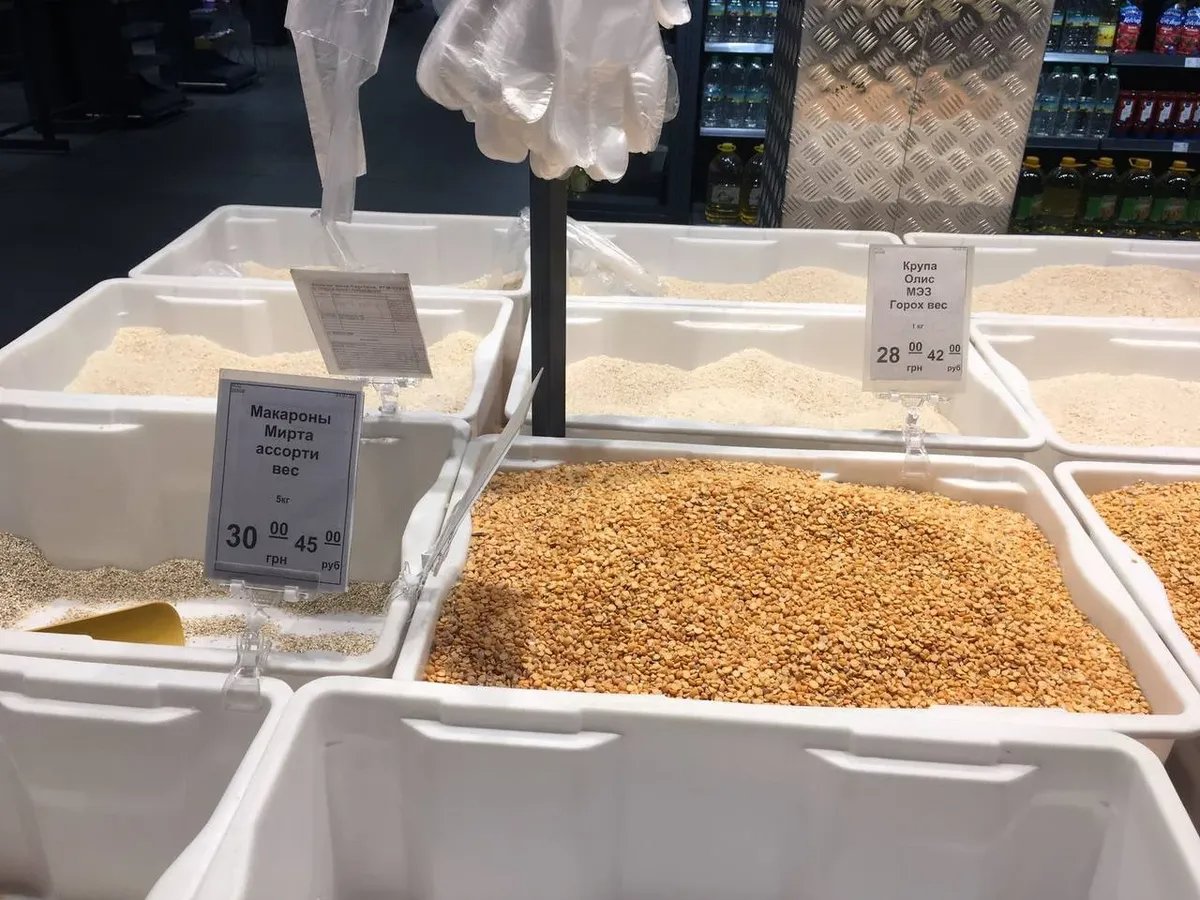
All shops have price tags both in hryvnias and rubles. Photo: Sonia Mustaeva
Hryvnias, Ukraine’s currency, are preferred by the local merchants and restaurants, not rubles. They, however, trade in two currencies. All shops have price tags both in hryvnias and rubles. The approximate exchange rate is 1 hryvnia = 2 rubles. Olha and Mykhailo say prices have doubled since Russia had invaded Ukraine, moreover, the range of goods offered for sale has shrunk. Medicines and personal hygiene products have increased in price more than any other commodity. It is challenging to purchase foreign menstrual pads, diapers, or baby food. Some people travel to Crimea for shopping. The local stores also import goods from the Russia-occupied peninsula.
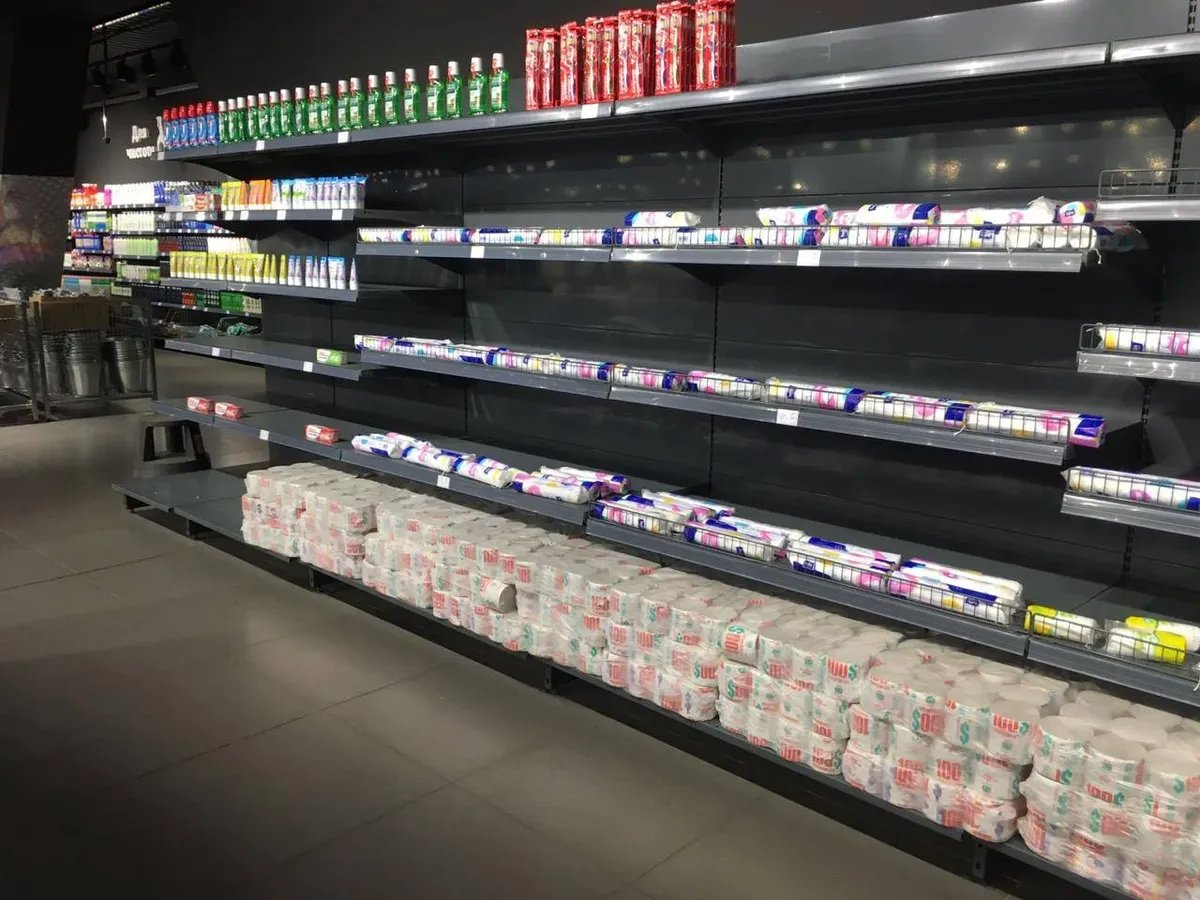
A look at the shelves in a local supermarket. Photo: Sonia Mustaeva
A local supermarket has a sign saying “no firearms or pets allowed inside the shop” on its front door. Almost half the shelves in this supermarket are stacked with vegetable oil from Zaporizhzhia, Lebanon, or Belarus.
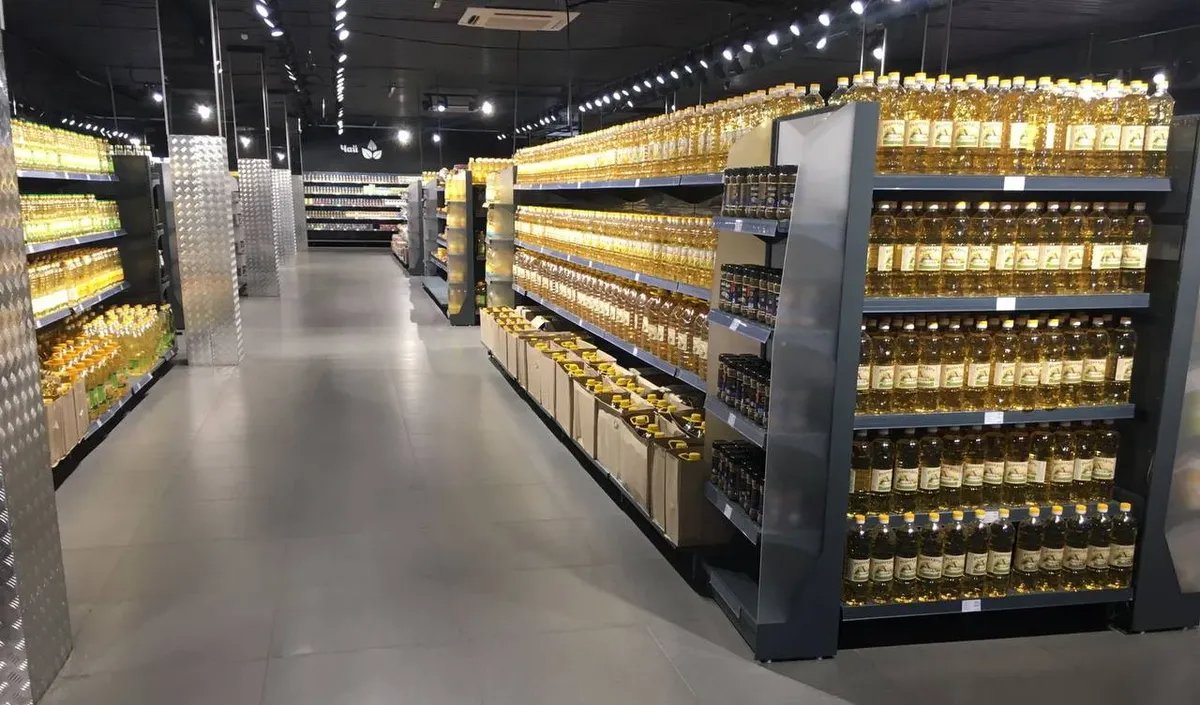
Vegetable oil shelves on the second floor of the supermarket. Photo: Sonia Mustaeva
Bottles of vinegar are placed nearby. There is some meat from “DPR”. The vegetables come from Ukraine-controlled areas, although it is not possible to find out where exactly they come from. All the other goods are from Russia or Crimea. They are placed horizontally to make it look like there is a lot to buy. One can purchase strong beverages from Ukraine or Russia, but the only flavour of juice available is tomato.
Things are different at the markets. There is more variety than in the shops. After the start of the war, most of the residents of the villages located near Melitopol went to work here; the war left most of them jobless.
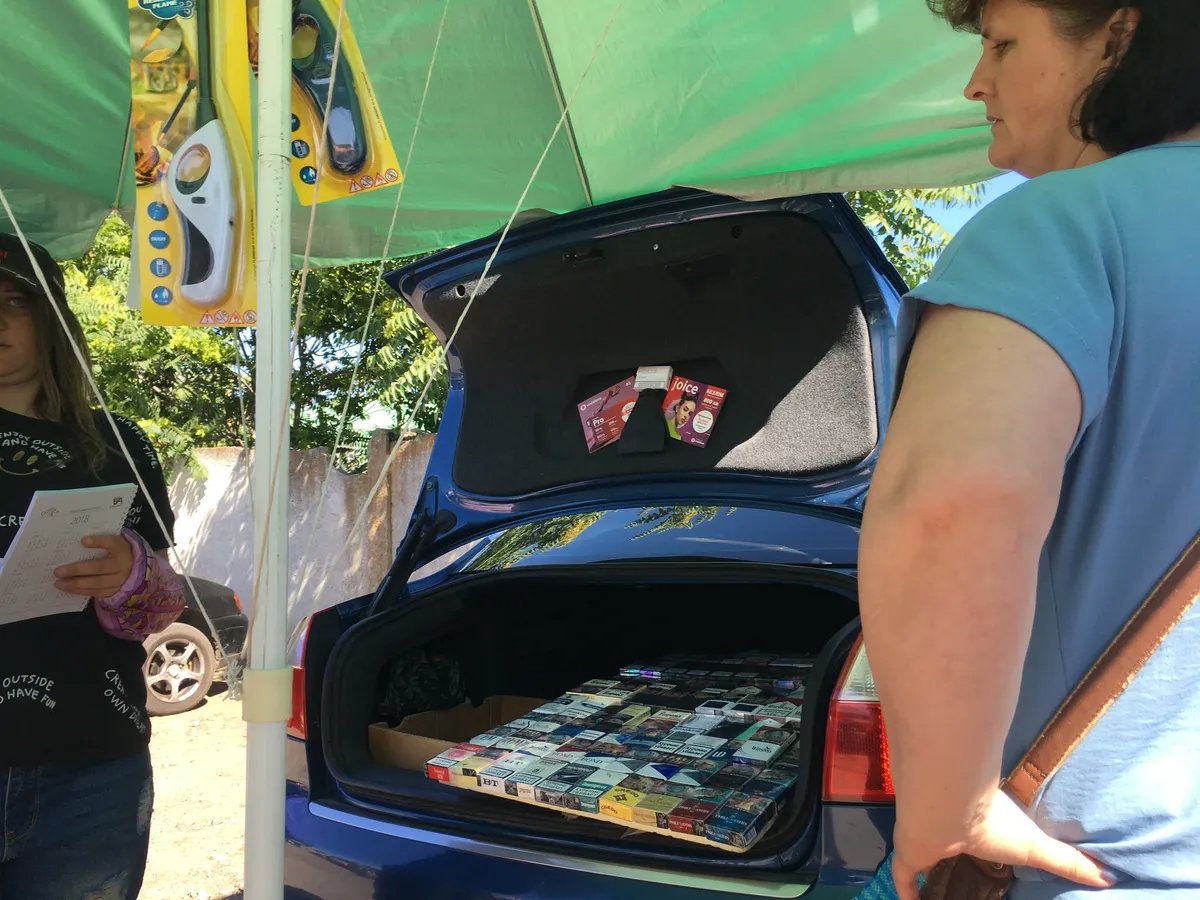
Selling cigarettes could end up being dangerous on the occupied territory. Photo: Sonia Mustaeva
The most profitable business is the trade of alcohol and tobacco. The assortment varies: there are Russian cigarettes from Duty Free
and counterfeit from Belarus and Kazakhstan. This kind of trading is half-legal. To get a bag full of cigarette packs, one has to go to a special location where, after coordinating with the seller, another person gives the buyer their goods. It is of valid importance that no one from the new administration witnesses the exchange, or the seller could lose their market spot.
According to Mykhailo and Olha, about two thirds of Melitopol’s residents have left the city. Now, there is no traffic; there are also almost no people outside. There are no signs of any past combat. Half-wrecked Russian military equipment, of which there was not a lot of in the first place, was quickly removed from the territory. Burnt and stolen civilian cars were hidden behind the gates of one of the police stations. Cars from local car dealerships were also moved from the city — it is unclear which side took them.
“It could have been Russians who transferred them to Crimea, or our people could have taken them to Ukraine,” Mykhailo reflects.
“It was definitely the Russians,” Olha insists. “I saw a whole row of brand-new foreign cars being transported across the border, after a man with a briefcase had talked to frontier guards.”
“Everyone looted, as you know. Both ours, and the zeds. Any of them could have taken the cars.”
“That’s true,” Olha sighs sadly.
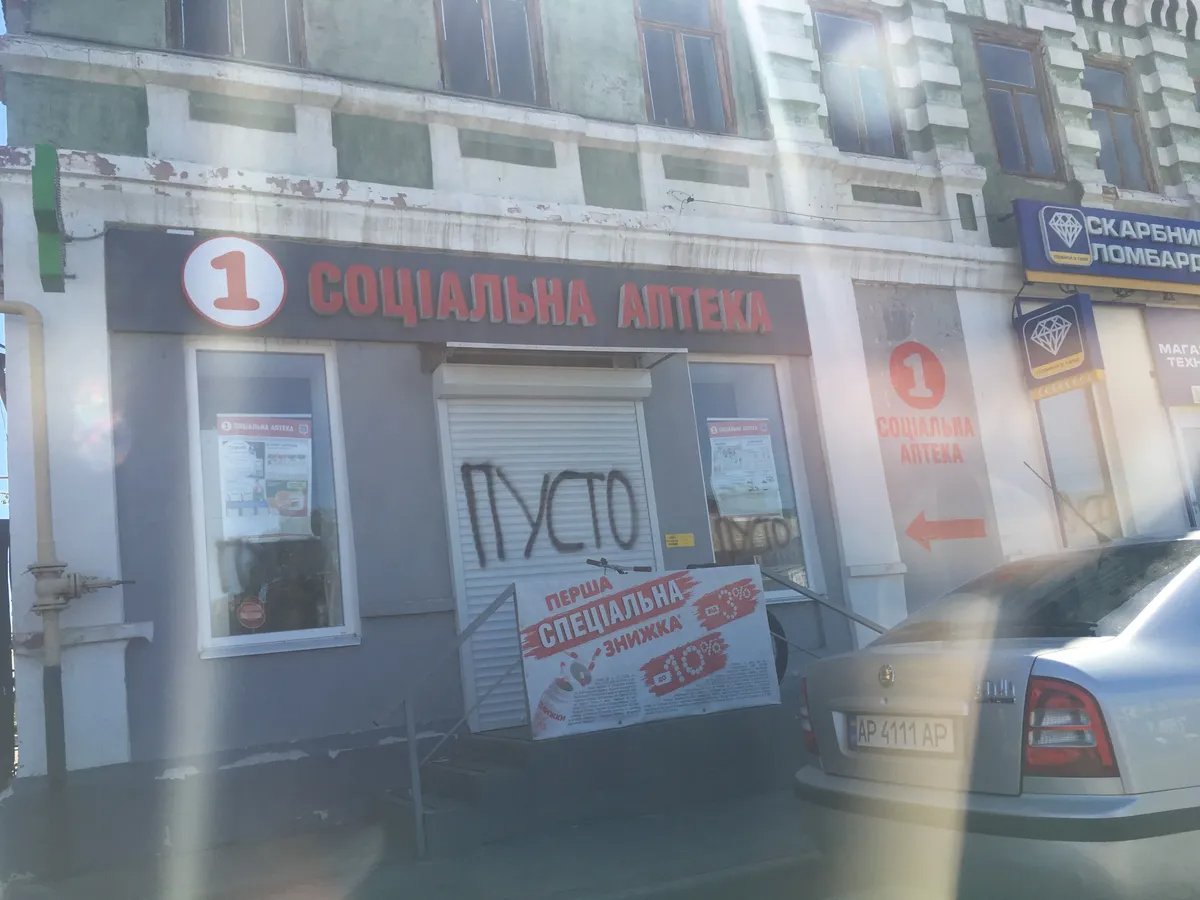
A sign on the door says “Empty”, it was made during the looting back in February. Photo: Sonia Mustaeva
The reminder of the looting that took place in Melitopol are the roller shutters of shops and pharmacies with the paint spelling out “Empty” on them. It is said that some owners painted these warnings themselves to avoid lootings or repeated attacks on their property.
Residents of the city speak carefully when asked about their opinion on current events. Even neighbours and friends are now treated with suspicion. All conversations about politics and war take place behind closed doors.
- the ones who are against the invasion and mock the new “government”;
- the ones who say nothing and try to adapt to the new reality;
- the ones who are happy about the Russian authorities and/or trying to win their support so they can get a job and a stable income.
The last ones are the minority, but it is unclear whether there are more people that are against the Russian invasion or who are neutral on the subject.
‘They will report everything about you’
The situation in the nearby villages is even more tense. The fact that everyone knows everyone puts residents at risk. They are living out Mafia, the game where unknown persons decide your fate.
For example, my interlocutors Ludmila and Zakhar (names changed for safety reasons), who live in one of the villages in the area, told me that their neighbour had been kidnapped. “Bag over the head and he was gone. It’s SBU (Security Service of Ukraine — translator’s note) kidnapping their employees, so they don’t have a chance to tell FSB anything. The police arrived, and even they didn’t know who took him. His wife is looking for him also.” The neighbour, according to Ludmila and Zakhar, collaborated with SBU before the war.
Ukraine’s special services kidnapping their ex-employees and informants is a topic widely covered by recently opened pro-Russian Telegram channels. Ukraine refutes these claims, saying that “investigations” of this kind are slander.
My interlocutors, despite being against Russian forces’ presence in the region, agree that Russian media are not lying on this subject: some of these stories’ protagonists are their close acquaintances and friends, whose biographies and connections to SBU were never a secret for them. Nevertheless, there is no reliable information on who exactly is kidnapping these people.
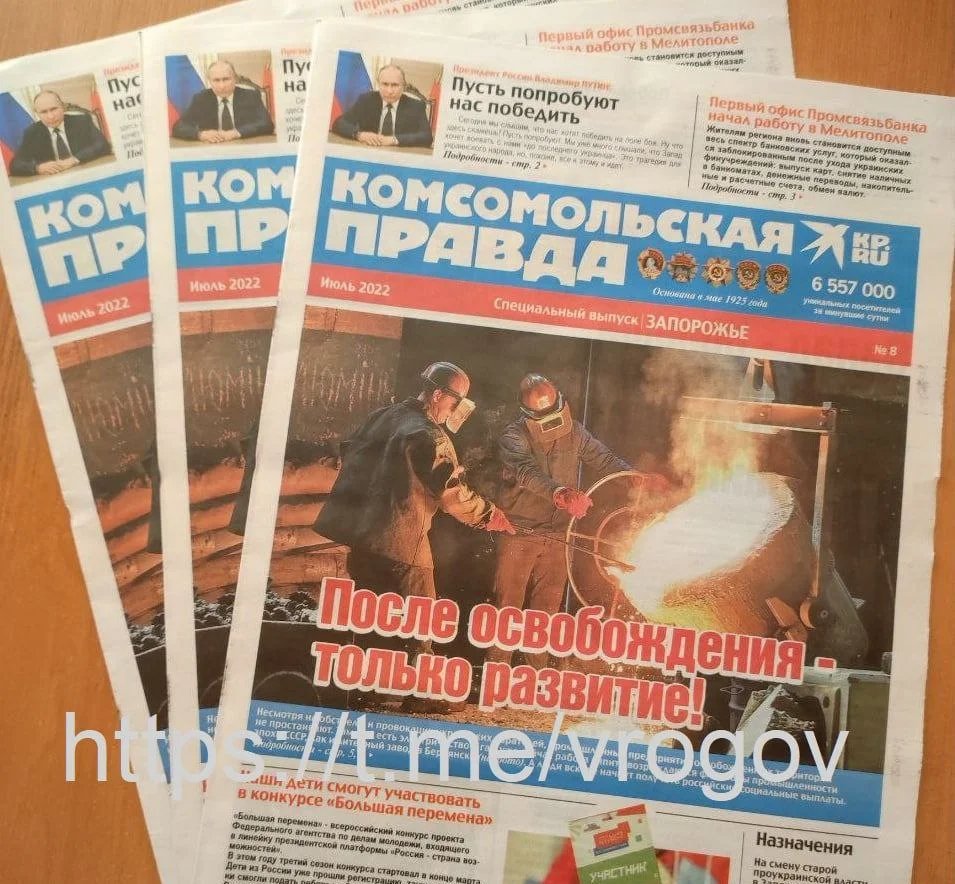
An issue of Komsomolskaya Pravda published in the region. Photo: Vladimir Rogov’s Telegram.
There are only Russian and pro-Russian media currently active on the occupied part of the Zaporizhzhia region. There are three radio stations and 16 TV channels. There are not any local TV channels or radio stations. Two newspapers are being published since the middle of July: Zaporizhzhia Messenger and Russia’s Komsomolskaya Pravda. Covers of both feature a photo of Putin. The headlines are similar to the TV channels’ rhetoric: there are articles about the “liberation”, future, and Vladimir Putin.
‘They will just shoot me’
I ask why Russian forces managed to capture the Zaporizhzhia region’s south so quickly, and Ludmila and Zakhar start telling me countless stories about their acquaintances who work in the military: on 23 and 24 February, they took their families and, on orders from commanders, left for Western Ukraine. “They set the [military] base on fire here nearby, so there would be no documents left,” sighs Zakhar.
“It’s as if they just surrendered us…” shares Ludmila. “The [Ukrainian] administration moved everything from here. They set all the documents on fire, we don’t exist anymore. There are no lists or documents any longer. People started to write their own. Back in March, our pensions were stolen. Three million hryvnias (€80,000) disappeared. No child welfare, nothing. On the one hand, that was the right thing to do — this way, Russians got nothing, but on the other hand — we can’t access anything now.”
On 11 July, the entire region was left without gas. Now, the issue is being solved by the civil military administration.
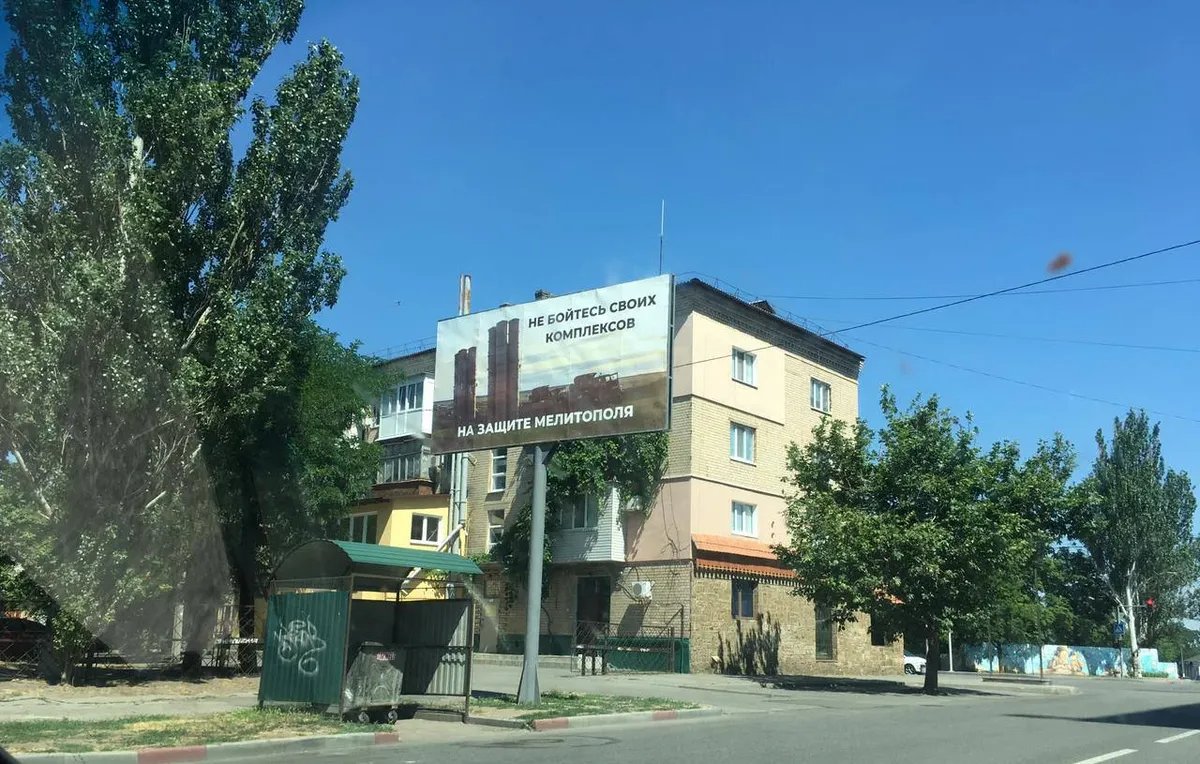
Billboard dedicated to the Russian military-industrial complex in Melitopol. Photo: Sonia Mustaeva
When asked about the behaviour of Russian soldiers in their village, Ludmila and Zakhar reply neutrally. According to them, they behave politely. The soldiers buy locals’ food, some sell their rations. “They don’t ask for food, don’t take anything of ours by force. Things are fine in our village, thank god. Some of the girls even go out with them,” says Ludmila.
Although, during the first days of the “special operation”, Russian soldiers pumped all the gas from gas stations and began to sell it to the locals.
But the most unpleasant thing local residents had to deal with were the cleanings, during which Russian servicemen searched for Ukrainian soldiers and hidden weapons in every house. The process itself was relatively harmless: no one went through the locals’ things, the soldiers just asked the residents to open their drawers and show what was inside. In fact, the locals face the majority of problems when dealing with the new policemen, most of which come from “DPR” and “LPR”.
“The police officers shamelessly stop by every week, looking for weapons. Someone somewhere told them something, apparently. No warrant, nothing,” Ludmila exclaims.
Ludmila herself sells cigarettes and alcohol. A week before the war, she stocked up on the goods, as she felt that “something was coming”. According to her, she and her village neighbours expected the military action to start on 22 February. It started two days later.
“I have a Ukrainian passport. Why would I be judged according to Russian laws? I have my own Constitution. It feels as if we were the ones who came to someone else’s country,” Zakhar wonders. “They say: ‘We are going to liberate Donetsk.’ Well, where’s Donetsk and where’s Melitopol? Why did you come here?”
“They haven’t won yet, [Ukraine] hasn’t lost yet, but here they are hanging up their flags. Why should I live by Russian laws? You tell me: where do I live? My passport’s cover is blue (Ukrainian passports have a blue cover — translator’s note). This is my home. If I start arguing with them, they ask [about her daughter]: ‘Do you want her to end up in an orphanage?’ They respond to everything with: ‘We will shoot you.’”
“We have been liberated from everything,” Zakhar reflects. “Nothing good left. Four of them stand with rifles in their hands and ask: ‘What do you think about the special operation?’ What answer do they want to hear from me? There are four of them, they have rifles, what could I possibly tell them? Of course, I’m okay with the operation. I can’t tell them: ‘Get out of here.’ This is war, they will just shoot me.”
“When they don’t like someone, they say: ‘Just shoot him. Everything will be written off as a war casualty, anyway,’” Ludmila explains.
“Half of these police officers are convicts. They were let out of prisons,” says Zakhar, confirming Mykhailo’s words.
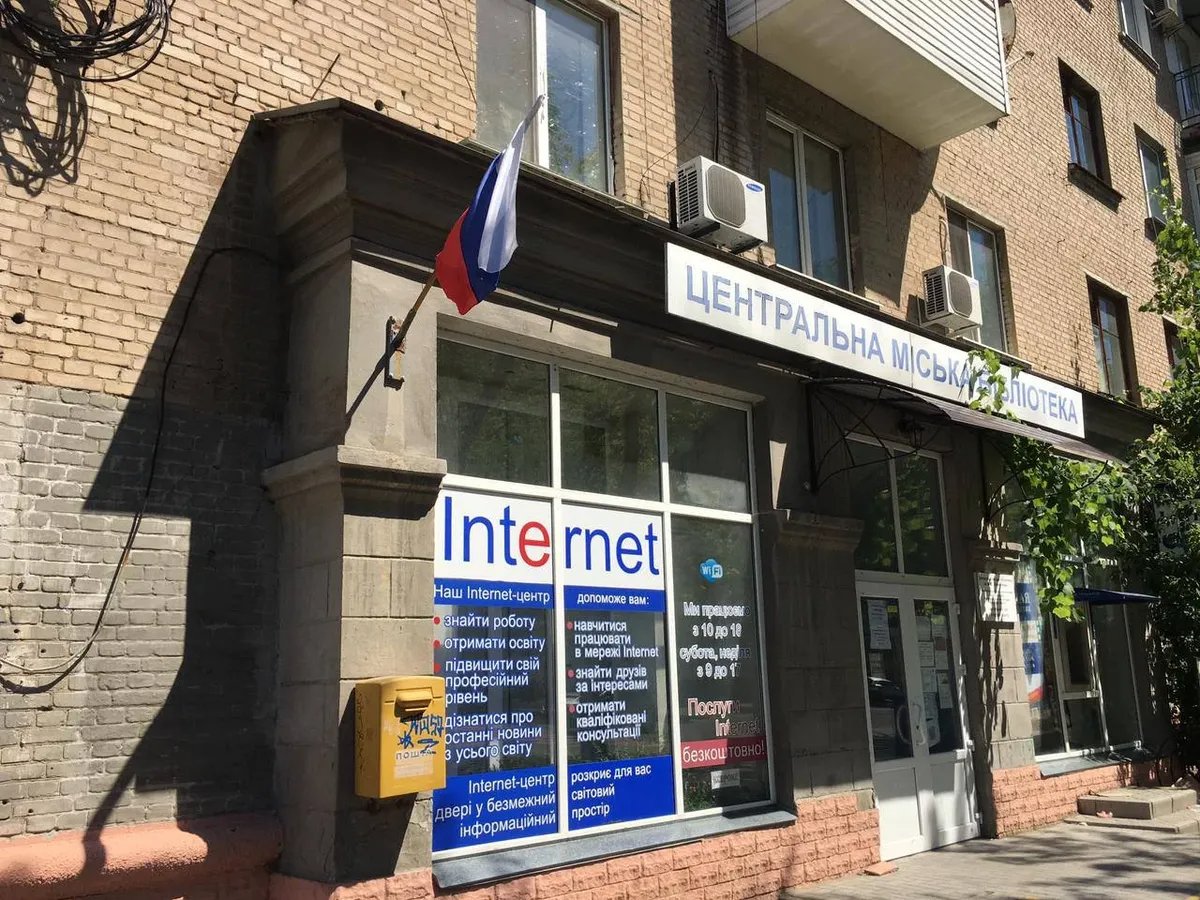
Russian flags are hung up everywhere. Photo: Sonia Mustaeva
For the first three months of the war, people lived off looting, reselling what they had stolen from food storehouses. Then the cherry season arrived; now, it is being sold at the markets. One can earn around 150-200 hryvnias (€4-5) per workday, selling cherry. Some people went to work for the new administration. According to Ludmila, people who had worked as policemen and firefighters were offered to evacuate from the Russia-occupied territories or refuse to work for the new administration and, thus, receive about 40,000 hryvnias (€1,000) per month on their Ukrainian salary debit card. Despite these measures, a part of them went to work for the military city administration.
“People are scared to work [for Russians]. Ukraine has already announced the ‘price’ for doing so, who will receive how many years. If one becomes a chair or a director — 15 years. SBU keeps tracks of all of them. Me talking to you, that’s already a sentence. The second one girl messaged our village chat that we needed to bring in the applications for first graders to a Russian school, she got a reply saying: ‘Your house will be the next one to burn.’ Well, how are we supposed to live day-to-day? What are we guilty of?”
“They only hire people if they already worked at the place they’re hiring for. If I hadn’t worked there, I won’t be hired. This is why the factories aren’t producing anything,” Zakhar says.
Crimea’s head Sergey Aksyonov announced 1 July as the date when electric trains would start running from Crimea to the Russia-occupied territories, but nothing ever came of it. Furthermore, in the early hours of 24 July, there were explosions on the railway road that goes through the Melitopol district. Olha confirms having heard them herself.
The military city administration promises the monthly salary of only 15,000 hryvnias (€400) to railway workers. There are no additional payments if you work nights. No one understands which labour laws they are even supposed to follow. The locals have been warned that they would be taxed, but in what way and what government they would be paying to was not explained, as was not the question of what the tax money would be spent on.
A private pharmacy operated in the village until a few weeks ago. Then, according to the locals’ theories, the owners were prohibited from selling Ukrainian medications and were promised that they would receive all the necessary items from Crimea; the owners refused and closed the pharmacy. Before it closed, people that wanted to buy medications had to queue from early morning, sometimes even from the night before. The people were included in the list of those waiting to purchase medicines, just as the pensioners back in the city that wanted to get their pension. Some, once they reached the cashier, bought all the medicine they could, to last them a long time.
“We all lived well. Lads worked, beautiful schools were being built, buildings were being repaired. Possibly, some Nazis existed, but in Mariupol and Dnipro, not here. They marched with the flags there. And even that happened in 2015. Here, everything was always quiet: serenity, cherry, the sea,” laments Ludmila. She adds: “People set their own fields on fire because harvesting the grain will end up costing more than what they would earn by selling it. The soldiers offer to buy a ton of grain for 1,300 hryvnias (€35). Harvesting one ton costs 1,000-1,500 hryvnias (€27-40). They later transfer that grain somewhere through Crimea. There are so many grain carriers at the border. They tell us: “Get used to living by Russian laws. Get used to living fairly.” Meanwhile, the zeds don’t follow traffic laws. When the light is red — they still drive at full speed. They’re very rude, they don’t care. They really like it here, I heard that some soldiers are planning on buying houses here.”
“Donetsk is in ruins. Everyone here is from Donetsk. Of course they want to buy houses here. Where else can they go, everything back there is destroyed,”
explains Zakhar.
‘It would be better if they just left quietly’
A curfew is enforced on the territories occupied by Russian troops. After 10PM, no one should be outside, except for patrolmen. Running into one after the curfew will get you sent to the line of contact where you will have to dig trenches, say the locals.
According to Ludmila, humanitarian aid is being given out only to those in deep need. Met with a request to provide aid to an ordinary person, they react like this: “You don’t look like someone in need.” Baby food is being provided only by Ukraine and Poland. Russian humanitarian aid does not include any.
Ludmila says that Russian soldiers constantly scare locals by saying that Ukrainian troops will bomb peaceful cities and kill anyone who speaks Russian. Although, no one says that this is how Ukraine’s Armed Forces could try to take occupied cities back from invaders.
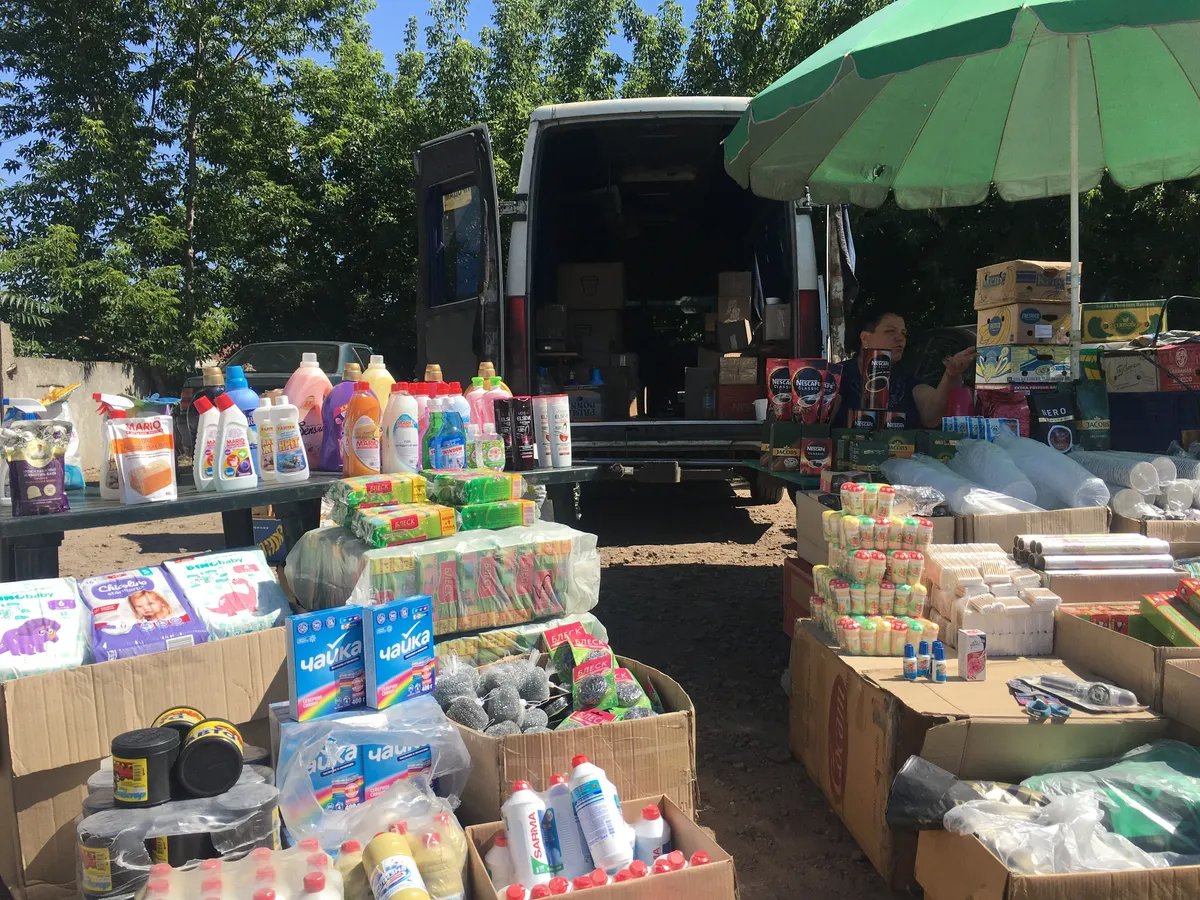
Goods being sold at the Melitopol market. Photo: Sonia Mustaeva
When asked about the alleged harassment of the Russian-speaking population in Ukraine, which the Russian government loves to bring up, the spouses say the following:
“We have spent our entire lives speaking Russian. No one has ever harassed us for it,” Ludmila tells me.
“When I watch TV, I understand only the general idea of what is being said. I don’t speak Ukrainian, although I passed a language exam back in school,” is Zakhar’s experience.
“It’s true that a law was passed, according to which the entire service industry had to switch to Ukrainian. But what’s surprising about that? Back in Moscow, do cashiers offer you gum in English? We live in Ukraine, that’s why people say: “Доброго дня, що потрiбно? Будь ласка, дякую.”
Ludmila says that people working in other industries could easily speak Russian to her. For example, a post office employee greeted her in Ukrainian and then asked whether she could continue in Russian.
The celebrations dedicated to Victory Day, a holiday Russian authorities get so excited by, in many families lasted for two days in a row: on 8 May, in accordance with the Ukrainian calendar there is Day of Mourning, and then on 9 May, in accordance with the Russian one, there is Victory Day. Zakhar says that the holiday never went anywhere, it was not cancelled, Ukraine just changed its date and name.
Ludmila has only one wish:
“I wish all of this would come to an end as soon as possible, I wish for certainty, tranquillity, stability. Of course, it’s good that our situation is not like what’s happening in Mariupol. We look at them and go: this is nuts. We were occupied but at least nothing got destroyed. It would be better if they just left quietly, and our people returned, and we would live in Ukraine. I don’t want destruction. We don’t even have any useable bomb shelters in the village. We are told: there will be a counter-offensive, leave. Where are we supposed to go? This is our home. If they return, we won’t be doing too well either. We are trapped.”
Join us in rebuilding Novaya Gazeta Europe
The Russian government has banned independent media. We were forced to leave our country in order to keep doing our job, telling our readers about what is going on Russia, Ukraine and Europe.
We will continue fighting against warfare and dictatorship. We believe that freedom of speech is the most efficient antidote against tyranny. Support us financially to help us fight for peace and freedom.
By clicking the Support button, you agree to the processing of your personal data.
To cancel a regular donation, please write to [email protected]
